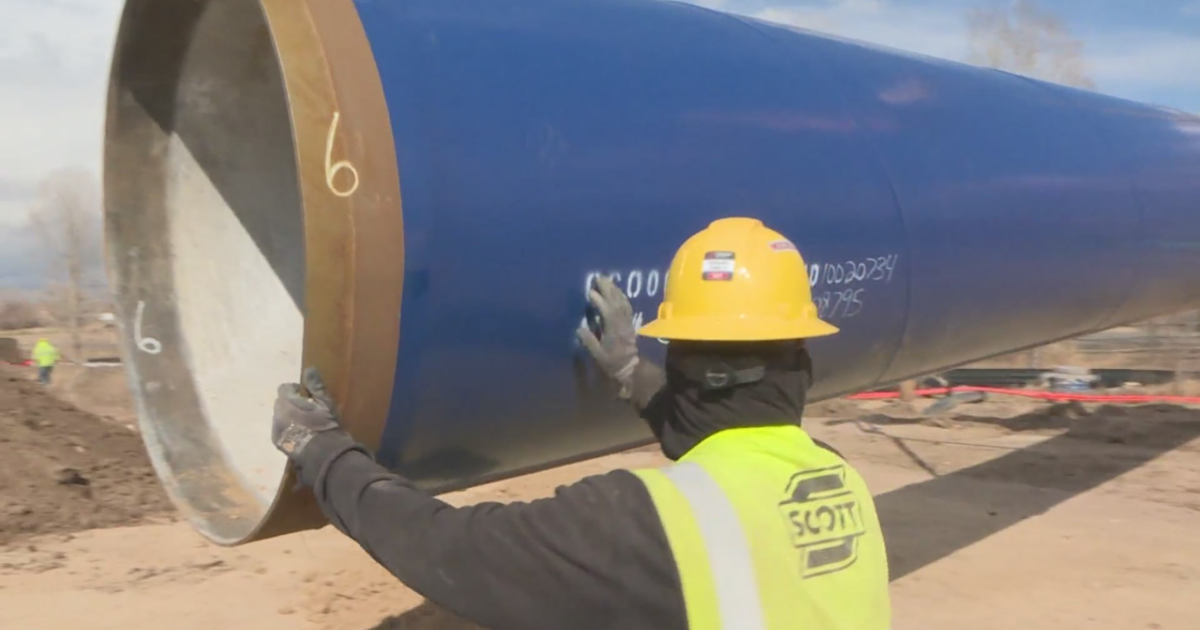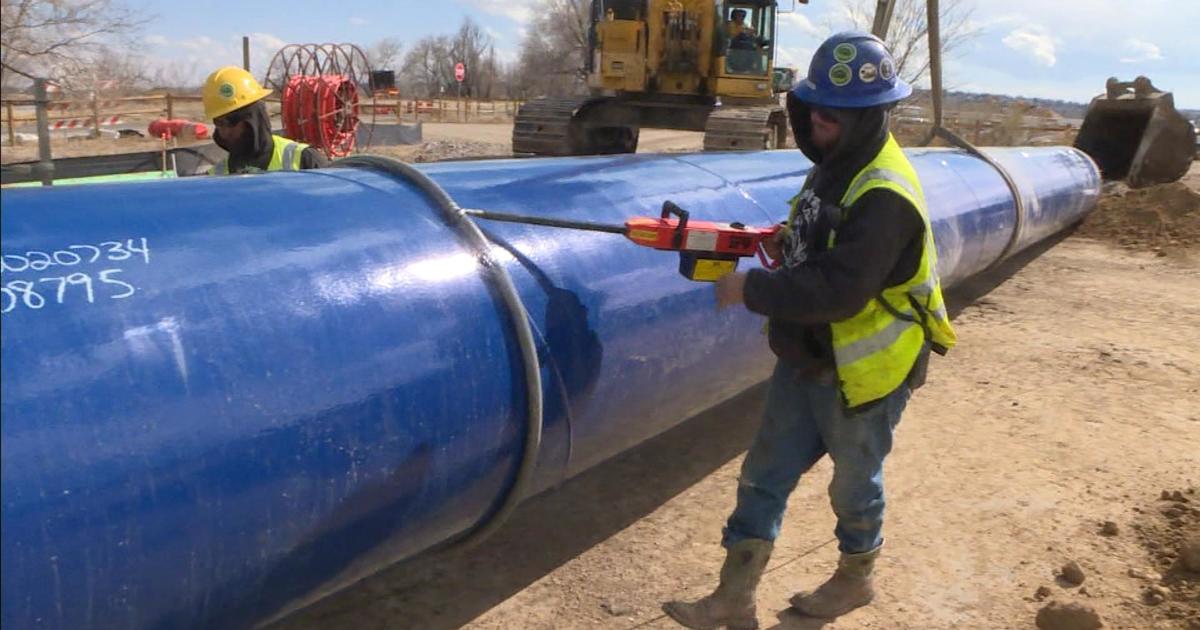'Forever Chemicals' Levels In Frisco Drinking Water Would Be Illegal In Three Other States, Residents 'Shocked'
FRISCO, Colo. (CBS4) - A CBS4 Investigates analysis of public testing data has found levels of perfluoroalkyl substances - commonly known as forever chemicals - in Frisco's drinking water would be considered too high in Vermont, Massachusetts, and New York. The levels would also trigger further testing requirements in Michigan.
PFAS are referred to as forever chemicals, because they do not break down in the environment, and they can build up in the body over time. The EPA says exposure to two types of PFAS chemicals - PFOA and PFOS - can cause birth defects, cancer, and thyroid issues, among other health problems.
Jessica Johnson, who lives and works in Frisco, said she was unaware of the elevated levels.
"I was pretty shocked, honestly, to learn that the forever chemicals were in our water," Johnson said. "It's concerning for me; thyroid issues run in my family, so I don't really want to do anything that would exacerbate that, because I'm sure it's probably looming on the horizon for me anyway."
The Findings
While there is no federal legal limit, the EPA recommends drinking water not have more than 70 parts per trillion of PFOA and PFOS combined, but some states say that's not good enough, setting more stringent legal limits.
Vermont has set a limit of 20 parts per trillion for five PFAS chemicals - PFOA, PFOS, PFHxS, PFNA, and PFHpA. Massachusetts has set a limit of 20 parts per trillion for those five chemicals and PFDA included. New York has set a limit of 10 parts per trillion for PFOA and PFOS each.
State health department testing conducted last summer found Frisco's drinking water had a level of 58.5 for the chemicals regulated in Massachusetts and Vermont, more than twice the legal limits in those states. The testing also found Frisco had a level of 11 parts per trillion of PFOS, which would be above the safe limit set in New York. Frisco's PFOA level was only 6.2 part per trillion, but would require quarterly testing in Michigan.
"Over the last several years, the Administration has supported local communities in taking aggressive action to test for PFAS contamination and to address it quickly," said Massachusetts Lieutenant Governor Karyn Polito in a news release last fall when the state first enacted its more stringent laws. "These new standards and grant funding reinforce our commitment to ensuring that all sources of drinking water across the state are safe, clean and healthy."
The news release went on to say Massachusetts' new laws were based on "the most up-to-date scientific data."
The Response
Back in Frisco, Johnson says her drinking water has always had a "metallic taste," but if she had known about the levels sooner, she would have started using a filter long ago.
"It seems like everyone I've mentioned this to has been completely taken aback and have also had no communication," Johnson said.
The Town of Frisco says right now, there's no health concern, because the PFAS levels are below the EPA's health advisory of 70 parts per trillion.
The town's mayor and water officials declined an interview with CBS4.
Frisco spokesperson Vanessa Agee wrote in an email, "an interview with Frisco's Water Division would do nothing to further your viewer's understanding of PFAS or alert them to a health danger, which are in fact really admirable and helpful goals that we hope you have much success with, as it is vital that we have the facts and current understanding around this evolving research into PFAS and PFAS' potential impacts on our health."
Asked why residents were not notified about the PFAS testing results, Agee wrote, "if there were a health concern, then the EPA and CDPHE would require individual notification of residents, and the Town would of course provide that notification swiftly because we authentically care about the health of our neighbors and friends, which is what Frisco's residents are in this very close-knit community and county. The public would be very well served by understanding that the science around PFAS is evolving, understanding where that science is right now, and having knowledge about what is being done across Colorado and the country to better understand PFAS and their impact on health."
The state health department has also told CBS4 in a past interview that residents should not be concerned about the elevated levels, because they are below the health advisory, but that if residents are still concerned, they can look at purchasing a reverse osmosis filtration system for their home or bottled water.
Johnson believes bottled water is not a good solution, telling CBS4, "I don't think, for being kind of a sustainable area, and considering Frisco has a bag ban on plastic bags, and our neighboring Breckenridge is a sustainable travel destination, I don't think that suggesting permanent residents to buy bottled water is a viable solution. If you think about every bottle that you drink is around here for 700 years or more. So, I'd rather not go that route."
The Laws
Currently, the state of Colorado has taken its own steps to begin regulating PFAS, for example, new state legislation has created a PFAS registry, so state officials know where industrial PFAS sources are located.
But Josh Kuhn with Conservation Colorado says the centennial state should study the issue further and look at setting its own more stringent legal limits.
"I think at the federal level, the health advisory level is outdated," Kuhn said.
The EPA's health advisory is now five years old, according to its website.
"More research needs to be done," Kuhn said. "Ultimately it's up to the federal government to make these laws, but at the state level it can and should be happening in lieu of lack of action at the federal level."
What's Next
In the meantime, Agee says Frisco is in the process of conducting further testing in other areas of its water distribution system, including at the tap "to get a more comprehensive picture."
The Colorado Department of Public Health and Environment also says it's in the process of developing a grant program to assist Frisco and other communities with additional testing.
"The CDPHE grant program has not been launched yet so the Town Water Division is doing what it does best, providing safe and delicious water, while always striving to have a full understanding of the facts," Agee said in an email to CBS4.
The CDPHE says the testing will help officials determine what areas and private wells may be at risk for PFAS.
One question remains: what is the source of the PFAS pollution in Frisco? PFAS can be found in a variety of household products, and even your clothes. The Environmental Working Group also found PFAS in cosmetics.
The state health department is working to find an answer in Frisco, writing to CBS4, "we expect these (test) results to provide insight into where the chemicals may be coming from."
The PFAS levels found in Frisco were part of a state-wide voluntary testing initiative led by the CDPHE, and made possible by money appropriated by the state legislature. To check the levels found in your water district, click here.
The CDPHE says 400 water districts across the state participated, but that is only about half of the total water districts statewide.
The CDPHE says, "we will encourage public water systems that have not yet tested to complete sampling and testing through this grant program."
Currently, the EPA is taking a closer look at setting federal legal limits for PFAS. Learn more about that here.
CBS4 Investigates will continue to follow the emerging issue of PFAS in Colorado's drinking water, and will update as we learn more.






